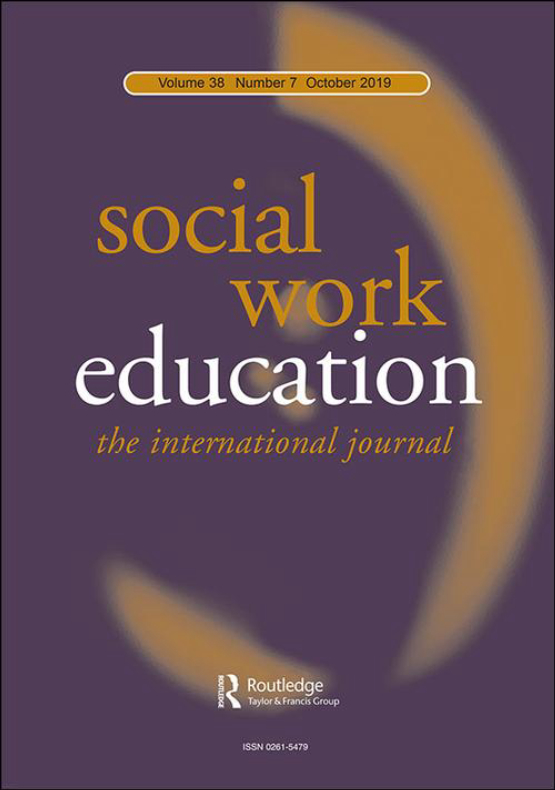Submit a Manuscript to the Journal
Social Work Education
For a Special Issue on
Embracing the Body in Social Work Education
Abstract deadline
30 October 2024
Manuscript deadline
30 August 2025

Special Issue Editor(s)
Yohai Hakak , [email protected]
Yari Or, [email protected]
Embracing the Body in Social Work Education
The "practice turn" in academia has brought attention to the importance of embodied practices, which can offer social work a new perspective in understanding the complexities of human experiences. Within the field of social work, the practice turn highlights the significant role of the human body in comprehending and addressing the needs of individuals and communities. It recognizes that bodies, belonging to both social workers and service users, are influenced by various factors such as time, space, and disciplinary contexts. This embodied perspective goes beyond seeing the body as a subject of societal scrutiny or resistance, emphasizing its value as a vital tool for practitioners – a sensory instrument that can perceive the nuances of external realities and internal responses. By focusing on embodiment, social work can delve deeper into the connections between the social and external world and the personal and internal world, thus better understanding how the body, as practice, mediates between them. This nuanced understanding enhances social work education and practice by promoting a holistic comprehension of human experiences and well-being.
Despite the importance of embodiment in social work, social work education has often neglected this aspect and remained distant from the practice turn and its theoretical developments. This has resulted in a lack of attention to the impact of embodied experiences on both the individuals and communities that social workers serve, as well as on the experiences and practices of social workers themselves. Therefore, it is crucial to prioritize the role of the body and embodiment in social work education. Recognizing this need, we invite scholars, educators, practitioners, and service users to contribute to a special issue focused on the theme of embodiment in social work education. This special issue aims to encourage exploration into various dimensions of the body's significance in the educational process of social work, inviting contributions that delve into emerging perspectives and practices.
Topics of interest include, but are not limited to:
- Embodied Learning in Social Work: Exploring how embodied learning in social work education can enhance experiential understanding and skill development among students. By incorporating embodied learning, social work education can provide a more immersive and holistic learning experience, fostering not only theoretical knowledge but also the practical and empathetic aspects essential for effective professional practice.
- Facilitating Well-being and Mental Health: This perspective explores the impact of embodiment on self-perception and mental health, particularly for social work students and practitioners. It also considers how these embodied experiences and learned practices shape the interactions and mental health outcomes of the individuals and communities served, and their ability to adopt trauma-informed approaches. Recognizing the embodied aspects of trauma is key to a holistic and thorough understanding.
- Somatic Approach to Working with Service Users: A somatic approach involves recognizing and harnessing the power of the body in interpersonal relationships and social work practice. It emphasizes the integration of physical, emotional, and sensory dimensions of human experience. By acknowledging embodiment, practitioners can cultivate deeper connections with service users, fostering trust and empathy. This approach considers both verbal and non-verbal communication, enhancing the overall effectiveness of social work interventions.
- The Body as Sensory and Practice Tool: This acknowledges the significance of the body in social work practice and the importance of understanding individuals and communities. Embodied practitioners integrate sensory experiences from home visits, such as smells, noises, sights, and sensations, into their assessments. This brings a more nuanced understanding to each case.
- Embodied and Inactive Cognition and their Impact on Social Work Practice: Educating social workers about the embodied and inactive nature of cognition and communication enhances their understanding of themselves, the people they work with.
- Embodied Living Systems - Linking Embodiment to Planetary Health: Embracing embodiment challenges the perception of separation and highlights our interconnectedness. This perspective explores the intricacies of living systems and links embodiment to planetary health. It acknowledges how our embodied experiences connect us to the environment and reinforces our responsibility for the well-being of the planet.
- Embodied Social Change: This inquiry examines the body as a site of racism and social change, exploring the profound impact of embodied experiences on issues of exclusion. Within the context of Social Work education, it advocates for the creation of transformative, body-centred healing spaces. This approach is deeply rooted in the principles of healing justice and embodied social justice, recognizing the body as a powerful tool for fostering both inner and outer societal transformation. It challenges conventional methods and promotes holistic strategies to address systemic challenges.
The special issue aims to uncover the transformative potential of the body and embodiment in training future social workers. We invite submissions that draw from diverse theoretical frameworks, empirical studies, and practical experiences, as this special issue seeks to showcase the multifaceted layers of embodiment in social work education. By doing so, we aspire to contribute to the advancement of a more inclusive, compassionate, and effective pedagogical approach.
Looking to Publish your Research?
Find out how to publish your research open access with Taylor & Francis Group.
Choose open accessSubmission Instructions
Authors interested in submitting a manuscript should send an abstract of no more than 500 words to Yohai Hakak ([email protected]) and Yari Or ([email protected]). Following the selection process, those chosen will be invited to submit full manuscripts of 8000 words. Non-traditional and artistic pieces are also welcomed.
Here are the deadlines for the submission process:
- October 30, 2024: Deadline for abstract submissions
- January 30, 2025: Invitations for full manuscripts will be sent out
- August 30, 2025: Deadline for submission of full manuscripts